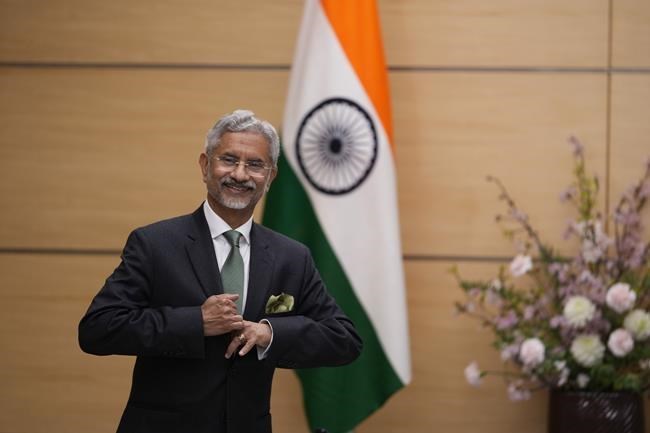OTTAWA ‚Äî India's Foreign Affairs Minister accused Canada of welcoming criminals from his country in response to the RCMP's recent arrests in a homicide that has roiled tensions between the two countries.¬Ý
Subrahmanyam Jaishankar also called Ottawa the No. 1 driver of what he described as a violent movement of Sikhs trying to carve their own country out of India.
"It's not so much a problem in the U.S.; our biggest problem right now is in Canada," Jaishankar said Saturday during remarks at a forum for intellectuals in India.
RCMP charged three Indian nationals last Friday in the death of Sikh activist Hardeep Singh Nijjar, who was shot dead last June as he left a temple in Surrey, B.C.
Nijjar was a fervent activist for the creation of a Sikh homeland called Khalistan, and his death sparked a wave of protests and rallies against Indian diplomats in Canada.
Those protests reached particular intensity after Prime Minister Justin Trudeau accused New Delhi last September of playing a role in the homicide.
While speaking at the forum in the eastern city of Bhubaneswar, Jaishankar took questions on multiple topics.
One attendee asked about countries like the U.S. and Canada wanting to partner with India while allowing people to support a separatist movement there, which New Delhi deems unconstitutional. Another attendee inquired about last Friday's arrests.
Jaishankar responded to both questions by saying the governing Liberals and other, unspecified political parties "pander" to Sikh separatists for votes, and "have given these kinds of extremism, separatism, advocates of violence a certain legitimacy in the name of free speech."
Last year's protests against Indian Prime Minister Narendra Modi's government included posters calling on people to "kill India" and offering cash rewards for the home addresses of Indian officials.
Jaishankar said he has asked Foreign Minister Mélanie Joly about "attacks or threats" to India's diplomatic missions and staff in Canada.
"I tell the foreign minister (Joly) saying, 'Suppose it happened to you. if it was your diplomat, your embassy, your flag, how would you react?' So, we have to keep our position strong," he said.
Jaishankar also reiterated his ministry's insistence that Ottawa is allowing criminal elements to operate in Canada and affiliate with Sikh separatists, in response to last week's arrests.
"Somebody may have been arrested; the police may have done some investigation. But the fact is (a) number of gangland people, (a) number of people with organized crime links from Punjab, have been made welcome in Canada," he said, referencing the Indian region the Khalistan movement wants to take over.
"These are wanted criminals from India; you have given them visas … and yet you allow them to live there."
New Delhi raised that same concern a week before Trudeau announced that India was suspected of involvement in Nijjar's death last September. In its readout of Trudeau's meeting with Modi, Jaishankar's ministry had called out "the nexus of (Khalistan separatism) forces with organized crime, drug syndicates and human trafficking."
But Ottawa has repeatedly insisted India has not proven that people it accuses of terrorism have actually done anything that meets the threshold under Canada's criminal code.
In February, a senior Canadian foreign-service bureaucrat told MPs that Canadian officials have been offering their Indian counterparts "workshops" on the rule of law, because India's definition of terrorism "does not always compute in our legal system."
In his remarks Saturday, Jaishankar also said "there will be pushback" to calls for Khalistan separation, but he didn't specify where that may come from.¬Ý
"It's no longer a world which runs as a one-way street," he said. "There will be a reaction; others will take steps or counter it."
India's high commission in Ottawa did not immediately respond when asked whether Jaishankar referred to pushback from India or by non-state elements.
Joly's office also did not immediately respond when asked for comment. Joly has previously said she wants to conduct diplomacy with India in private.
Human Rights Watch says Modi has overseen a deterioration of civil rights in India and promoted an "ultranationalist ideology" that has fuelled violent attacks on non-Hindu citizens.
The organization has called on India to look into possible involvement in Nijjar's death, given "Indian authorities' repeated failure to hold police and military personnel accountable for unlawful killings" within the country.
India has previously urged Canada to prosecute people for glorifying those linked to the 1985 Air India bombing, which followed an intense period of ethnic violence.
This report by The Canadian Press was first published May 5, 2024.
Dylan Robertson, The Canadian Press




